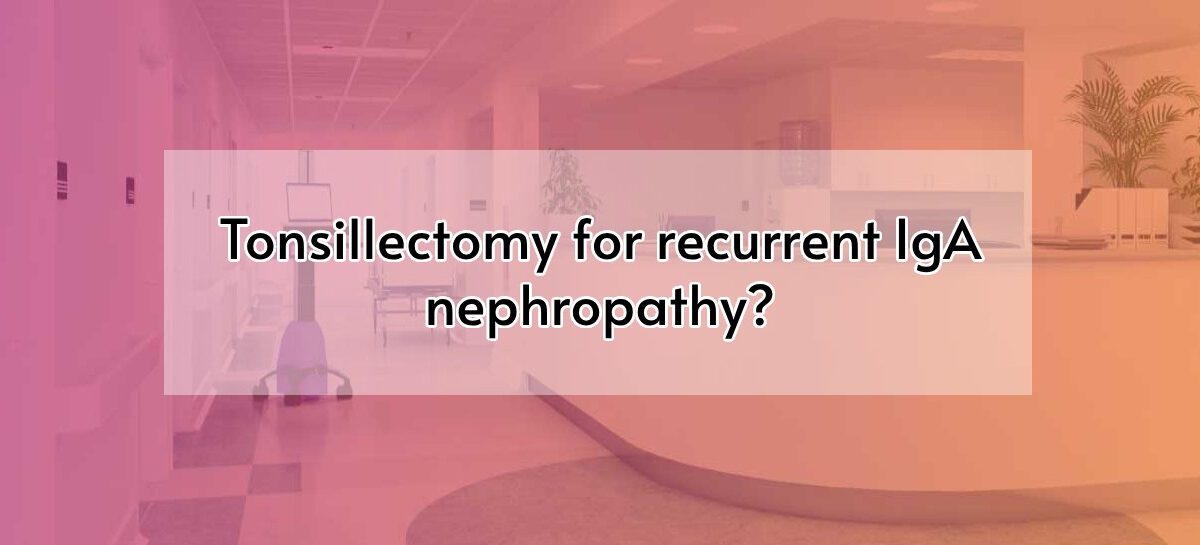Case report:
A 22-year-old college student, known Wilm’s tumour – status post right nephrectomy at 2 years of age, known hypertensive for 2 years, developed chronic kidney disease secondary to IgA nephropathy and was on maintenance hemodialysis thrice weekly since 2022. He underwent live related renal transplant in November 2022 having mother as his donor. He was on triple immunosuppressives following transplant. His serum creatinine was 1.6 mg/dL on discharge, and he was maintaining the same for the next 6 months.
In May 2023, his serum creatinine elevated to 1.98 mg/dL and renal biopsy was done. The renal allograft biopsy showed segmental endocapillary hypercellularity with cellular crescent formation in 1 glomerulus. There is tubular epithelial cell injury, cytoplasmic vacuoles seen in many of the tubular cells. Immunofluorescence is positive for IgA on the mesangium which is suggestive of IgA nephropathy implying recurrence of IgA nephropathy in the renal allograft also.
His serum creatinine continued to raise to 2.5 mg/dL on subsequent months. He was presumed to have cell mediated rejection and 3 doses of iv methyl prednisolone was given. He developed facial puffiness with nephrotic range of proteinuria. So a 2nd renal allograft biopsy was done in June 2023 which is suggestive of acute tubular injury and IgA nephropathy. In view of persistent Acute Tubular Injury, oral tacrolimus was stopped. His serum creatinine gradually elevated to 3.2 g/dL in November 2023. Elective tonsillectomy was done in December 2023 in view of recurrent IgA nephropathy. His serum creatinine started declining to 2.7 mg/dL on subsequent months post tonsillectomy and is on follow up now.
Discussion:
IgA nephropathy is the most common type of primary glomerulonephritis in worldwide. It can occur as a sporadic or familial disease depending on the clinical characteristics of the disease. In addition to hematuria, patients with proteinuria have poorer renal outcome (1). Studies show that a likely pathogenic variant of WT1 (Wilm’s tumour suppressor gene 1) that was consecrated with proteinuria presented with a more severe phenotype and rapid progression to end stage kidney disease (2). They suggested that the WT1 missense variant-induced primary podocyte injury is responsible for the proteinuria phenotype and IgA nephropathy.
The WT1 gene, located on chromosome 11p13, is predominantly expressed in maturing podocytes in adult kidneys and is related to glomerular filtration barrier function especially in proteinuria (3). Mutation in WT1 gene can cause FSGS and nephrotic syndrome indicating its essential role in the function of podocytes (4).
The pathogenesis of IgA nephropathy involves the production of abnormal galactose deficient IgA1(Gd-IgA1) in response to class-switching B cells in the mucosa for which autoantibodies are produced and those immune complexes gets deposited in the glomerular mesangium (5). During the production of Gd-IgA1, toll-like receptors (TLR-9) are over-expressed in tonsils after upper respiratory tract infection like tonsillitis (6). Tonsillectomy has been considered a treatment for IgA nephropathy as it impedes the first step in the production of Gd-IgA1 (7). It is aimed at removing a source of pathogens, reducing mucosa-associated lymphoid tissue and decreasing polymeric IgA synthesis. However its beneficial effect is still controversial. Yamabe et al studied when tonsils were directly stimulated by tonsil provocation test, 40 out of 62 patients with IgAN showed deterioration of urinary findings after the stimulation compared with 6 of 20 patients with other renal diseases (8). A study conducted in Japan, showed that tonsillectomy performed at any time during a patient’s life was effective in preventing progression to end stage kidney disease. Furthermore, its efficacy was was significant for patients with IgAN who had proteinuria >1 g/d (9).
Conclusion:
Tonsillectomy was a relatively safe procedure that did not cause major complications among patients with IgAN and hence tonsillectomy can be carried out in patients with IgAN for preventing disease progression and recurrence in post transplant patients.
References:
- Shi M, Yu S, Ouyang Y, Jin Y, Chen Z, Wei W, et al. Increased lifetime risk of ESRD in familial IgA nephropathy. Kidney Int Rep.(2021) 6:91–100. doi: 10.1016/j.ekir.2020.10.015
- Thompson A, Carroll K, A Inker L, Floege J, Perkovic V, Boyer-Suavet S, et al. Proteinuria reduction as a surrogate end point in trials of IgA nephropathy. Clin J Am Soc Nephrol.(2019) 14:469–81. doi: 10.2215/CJN.08600718
- Lipska BS, Ranchin B, Iatropoulos P, Gellermann J, Melk A, Ozaltin F, et al. Genotype–phenotype associations in WT1 glomerulopathy. Kidney Int.(2014) 85:1169–78. doi: 10.1038/ki.2013.519
- Hall G, Gbadegesin RA, Lavin P, Wu G, Liu Y, Oh EC, et al. A novel missense mutation of Wilms’ Tumor 1 causes autosomal dominant FSGS. J Am Soc Nephrol.(2015) 26:831–43. doi: 10.1681/ASN.2013101053
- Floege J, Moura IC, Daha MR: New insights into the pathogenesis of IgA nephropathy. Semin Immunopathol36: 431–442, 2014
- Suzuki H, Kiryluk K, Novak J, Moldoveanu Z, Herr AB, Renfrow MB, Wyatt RJ, Scolari F, Mestecky J, Gharavi AG, Julian BA: The pathophysiology of IgA nephropathy. J Am Soc Nephrol22: 1795–1803, 2011
- Nakata J, Suzuki Y, Suzuki H, Sato D, Kano T, Yanagawa H, Matsuzaki K, Horikoshi S, Novak J, Tomino Y: Changes in nephritogenic serum galactose-deficient IgA1 in IgA nephropathy following tonsillectomy and steroid therapy. PLoS One9: e89707, 2014
- Yamabe H. Osawa H. Inuma H et al. deterioration of urinary findings after tonsil stimulation inpatients with IgA nephropathy. Acta Otolaryngol Suppl. 1996; 523: 169-171
- https://www.ncbi.nlm.nih.gov/pmc/articles/PMC8815505/
 Dr.Prathibha Thangadurai,
Dr.Prathibha Thangadurai,
DrNB resident in Nephrology,
Kauvery Hospital, Alwarpet



